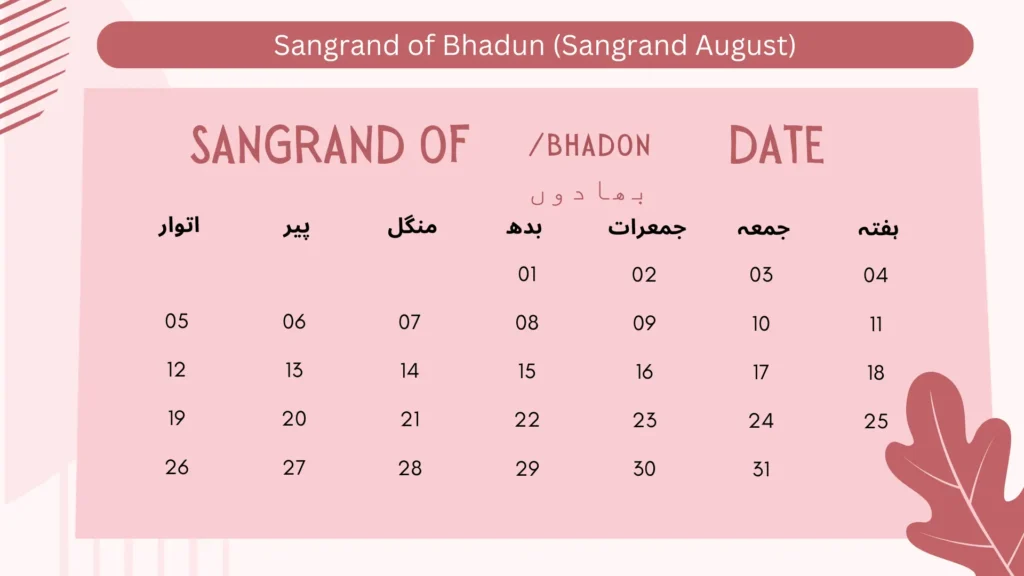Sangrand of Bhadun in August According to the Nanakshahi Samvat Calendar
In August, on the 16th of August, it is the Sangrand of Bhadun (ਸੰਗਰਾਂਦ, the first day of the month) (ਭਾਦੋਂ, a month in the Sikh calendar). Sahib Sri Guru Arjan Dev Sahib Ji Maharaj teaches us that in this month, “Phaduay Parm Pulania” (ਫੜੂਏ ਪਰਮ ਪਲਾਣੀਆਂ), we might experience confusion and loss.
You can view the list of all Sangrand dates for each month in the current year. You can also see the English calendar dates for Sangrand in January, February, March, April, May, June, July, September, October, November, and December for the current year.

Understand Meaning of “Phaduay Parm Pulania” During Sangrand of Bhadun
During Sangrand of Bhadun or In the month of Bhadun Phaduay Parm Pulania(ਫੜੂਏ ਪਰਮ ਪਲਾਣੀਆਂ), Parma (ਪਰਮਾ) means confusion, and Pulania (ਪਲਾਣੀਆਂ) means lost. We can become lost and confused in this month of Bhadun (ਭਾਦੋਂ). On our spiritual path, the path that we are walking towards Akal Prabhu Waheguru (ਅਕਾਲ ਪ੍ਰਭੂ ਵਾਹਿਗੁਰੂ, the Eternal God), we can become lost, confused, and go astray.
Causes of Confusion During the Sangrand of Bhadun
Doja Laga Headh
Why does this happen? If we engage in Doja Laga Headh (ਦੂਜਾ ਲਗਾ ਹੇਠ), Doja (ਦੂਜਾ) means a second, and Headh (ਹੇਠ) means love. If we show love, become attached, or give devotion to a secondary source rather than the primal aspect or the primary aspect, which is Ik Oankar(ਇੱਕ ਓਅੰਕਾਰ, the One Almighty Lord who has no opposition), who is the creator, the nourisher, and the deliverer of us back into Himself, then we lose our way.
Akal Prabhu Waheguru, through Sri Guru Arjan Dev Sahib Ji, is teaching us that During the Sangrand of Bhadun or in this month of Bhadun, if we are joined with a secondary source, if we split our love from Waheguru and share it elsewhere, then on our spiritual progression, we will become lost and confused and go astray. We will need help to join with Akal Purkh Waheguru.
Example from Everyday Life
This concept is evident in life. Even if we take a simple example of food, such as if we like cakes and choose between chocolate cake and vanilla flavor, we might become torn between the two. We nibble a bit of one and then the other because our love and attachment are split. We don’t necessarily get the specific peace we want because we’ve divided our thoughts and desires between the two.
In the same way, if we take our love from Waheguru and direct it elsewhere to a secondary source, we won’t enjoy the bliss that comes from Waheguru because some of our passion is directed elsewhere. Guru Gobind Singh Sahib Ji teaches us that only those with complete love and devotion will find Waheguru. We should have the mindset of sacrifice and giving up everything for Waheguru.
I’ve heard of other doctrines, faiths, and belief systems, but I don’t agree with or believe in any of them because my love and devotion are only towards you, Waheguru. Through our Guru, Guru Shabad, and the teachings of our Gurus, given to us in Sri Guru Granth Sahib Ji (ਸ੍ਰੀ ਗੁਰੂ ਗ੍ਰੰਥ ਸਾਹਿਬ ਜੀ) and through the Guru Khalsa (ਗੁਰੂ ਖਾਲਸਾ), we are guided.
Different Types of Param (Confusion)
During the Sangrand of Bhadun or in this month of Bhadun, if we show love elsewhere and have a secondary place where we give our love, we will be lost, confused, and unable to follow the proper path. Scholars have talked about different types of Param (ਪਰਮ, confusion) and different ways we can get confused:
Bhed Param
Bhed Param (ਭੇਦ ਪਰਮ) is when we don’t believe God exists within us, in our Atma(ਆਤਮਾ, soul). Our Guru teaches us that our soul, our Atma, is part of Waheguru, the Paramatma (ਪਰਮਾਤਮਾ, Supreme Soul). When we realize the Atma within us, we experience God within ourselves. But suppose we don’t believe God exists within us. In that case, we seek God outside, fall in love with materialism, and neglect meditation and the recitation of Gurbani.
Garta Param
Garta Param(ਗਰਤਾ ਪਰਮ) is when we accept that God exists within us. Still, we develop an ego and start believing we are God ourselves. We may create certain powers and, because of them, start thinking we are God, just like Harnakash (ਹਰਨਾਖਸ਼, a mythical king who believed he was God). Our ego becomes too much for us to handle.
Sanga Param
Sanga Param(ਸੰਗਾ ਪਰਮ) is when we become attached to our body. We believe the body is us and don’t want to leave it. We don’t realize that the body is just a carrier of our soul in this life, and in previous lives, we had different bodies. We become so attached to this body that we don’t want to leave it, thinking it is our true self rather than realizing we are the soul within.
Bikar Param
Bikar Param(ਬਿਕਾਰ ਪਰਮ) is when we believe that although God created this world, God doesn’t exist within it, viewing the world as a negative aspect of Waheguru. We don’t see God in all things or treat others respectfully. We stop performing Seva (ਸੇਵਾ, selfless service) because we view everything as unfavorable.
Satya Param
In Satya Param (ਸਤਿਆ ਪਰਮ), we understand that God exists in the world. Still, we start believing that the materialistic aspect of the world, the Maya (ਮਾਇਆ, illusion), is accurate and equate it to God. We forget that the world is an illusion, created and destroyed by the Almighty, and become confused by the creation itself.
Summary of Param
These are the five types of Param (ਪਰਮ, confusion) that can lead us astray from Waheguru:
- Believing God is not within us.
- Believing we are God ourselves.
- Becoming attached to our body and not wanting to leave it.
- Not realizing God exists in the world leads us to stop serving within it.
- Believing the world is entirely accurate and becoming attached to the Maya, the materialistic aspect.
Conclusion: Remaining on the Path during the Sangrand of Bhadun
During the Sangrand of Bhadun or in the month of Bhadun, if we focus on devotion and give it to another, we will fall astray. Let us hope and pray that Guru Sahib Ji blesses us so we don’t lose our love and devotion towards Akal Purkh Waheguru. Let us pray we don’t get lost or confused in this month of Bhadun or during the Sangrand of Bhadun and are blessed to live in Sikhi (ਸਿੱਖੀ, the way of life of Sikhs) and with the blessings of Akal Purkh Waheguru.
